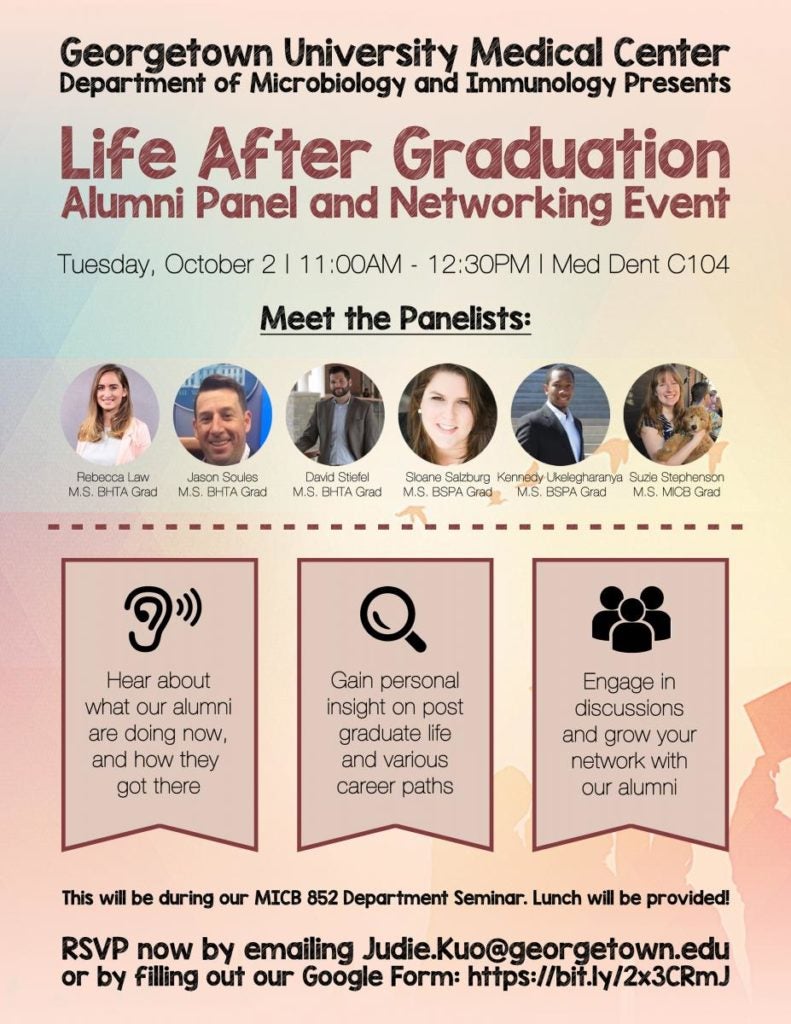Life After Graduation Fall 2018 – Hear From Our Alumni!
The Department of Microbiology and Immunology was excited to host our 2nd Annual Alumni Panel and Networking Event, called “Life After Graduation,” on Tuesday, October 2nd, 2018. This event was a great opportunity for our students and applicants to hear from the alumni of our M.S. Biohazardous Threat Agents and Emerging Infectious Disease (BHTA), M.S. Biomedical Science Policy and Advocacy (BSPA), and M.S. Microbiology and Immunology (MICB) programs. Attendees not only had the opportunity to hear from the alumni, but also had a Q&A and networking session with them.
From this event, we would like to emphasize some key points that our alumni has shared with our students, and help you reach your goals! Meet the alumni who attended our event, and read below for some advice that some of our alumni have for you:
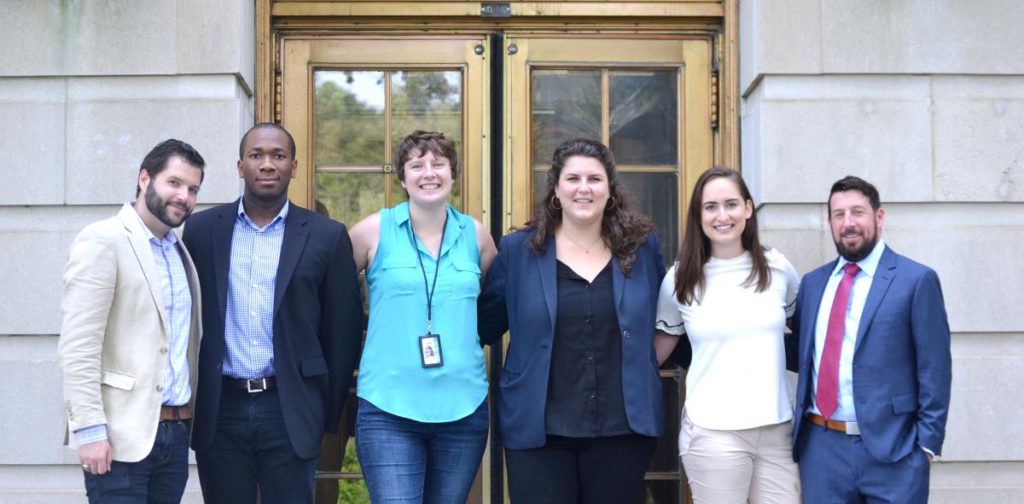
How did your time at Georgetown prepare you for your current career? What skills or knowledge did you learn throughout the program that you found most useful in your career?

Rebecca Law: I am currently working at a defense contractor–Engility Corporation–doing business development, capture, and strategic growth for the CBRNE portfolio. Currently, I am working on a response to a Request for Information (RFI) from the government on how best to organize a specific CBRNE contract utilizing the knowledge I have from our Master’s program. Additionally, the connections I have made during my time at Georgetown have been incredibly helpful. It’s a small community, but building your network is incredibly important and this gave me a head start as well as diverse mentors. I also have really benefited from the broad range of subjects the program covers because one day I could be working on a proposal involving biosurveillance and the next day helping shape a contract dealing with chemical threats.

David Stiefel: Georgetown helped my career by building out my network. I learned a variety of valuable skills that gave me a broad knowledge base in a specific field. You will get out of GU what you put in. If you use the time right, you will learn time management, how the government “works”, and that there are multiple routes to the same career.

Suzie Stephenson: My time in the Department of Microbiology and Immunology at Georgetown as an MS student prepared me immensely for my time as a PhD student. As an MS student, I worked in Dr. Casey’s lab, took more credits than was required and met all of the professors in the department that I could. Subsequently, I got into the PhD program, all of the classes I took went towards my PhD class requirement and I had essentially already started my thesis work. I still maintain that my connections in the department, along with hard work, good grades and decent lab experience, helped me get into the PhD program.
What advice do you have for M.S. students as they look for future careers or future programs to apply to?

Rebecca Law: (1) Network, network, network! Utilize your position as a student to meet with the big dogs and ask them the hard questions because it’s much more difficult when you’re a working professional. (2) The people really matter. You could be doing something really cool or really boring, but the people you work with are so crucial. Along the same vein, be someone they want to work with in an interview because that’s as important of a factor as skill set. (3) Find mentors! Find someone who is in your corner and see if you can work on a project with them or shadow them (hard in our field sometimes but in the health profession a little easier) or if they can connect you with anyone in the field you want to join. Also, don’t be intimidated, we’re all fake adults still figuring it out too. (4) Find a place that lets you telework every now and then (unless it’s for security reasons that you can’t and don’t abuse it) because sometimes you need a day on the couch with your dog.

Daivd Stiefel: Take advantage of your time at Georgetown. You are exposed to dozens of influential professionals. Get to know them. Network. Keep on their radar. Don’t just ask for things, offer and build relationships. Apply to jobs/programs as if that is your job. The day you get an interview, apply for another job. If you do all of these things you will have a large base of applications, potential job offers, and mentors with whom you can lean on for advice. Be flexible. Be open. Be willing to try something that is tangential to your “perfect” job. Be an individual. Fit in without fading into the background.

Suzie Stephenson: If you want to get into the Georgetown PhD program, or any PhD program, I believe that there are key things you should do. First, you must work in a lab, not only for the experience for your resume, but also so that you understand if lab work is for you (because it’s going to be most of your PhD) and you build a great rapport with your Principle Investigator (PI) – who you will be asking for a recommendation from. Second, you should take a tough course load and get good grades in those courses so that you can show the application committee that you can handle the rigorous PhD course load. Third, you should get to know the professors in the department, as they a) have been through the process themselves and b) are either on the application committee or will interview you. Therefore, they can give you some great advice on personal statements, interviews and other application-related things; also, knowing the people who are interviewing you take away a bunch of stress on interview day!
What do you know now that you wish you knew during your time at Georgetown?

Rebecca Law: Attend as many events and conferences, etc. as you can because you won’t have time when you’re working. It’s also usually cheaper as a student. Also, always ask questions during Q&A sessions because people are more likely to come up to you to discuss it/will remember you, but make sure they’re smart and relevant and you’re not just asking to ask one.

David Stiefel: Getting the “perfect” job is not a one step task. You will struggle and be unhappy. Use that as a learning experience. The job you think you want you may actually hate. The job you think you will hate may actually be your favorite.

Suzie Stephenson: I think that while at Georgetown, you should take the opportunity to take as many classes in the other MS programs in our department, or even other departments. I took some biohazardous threats classes and really enjoyed them, and I audited an RNA sequencing class. Lastly, just have fun!
We truly thank each and every alumni that were able to come out and attend our event! Here are some of the photos taken during this event:
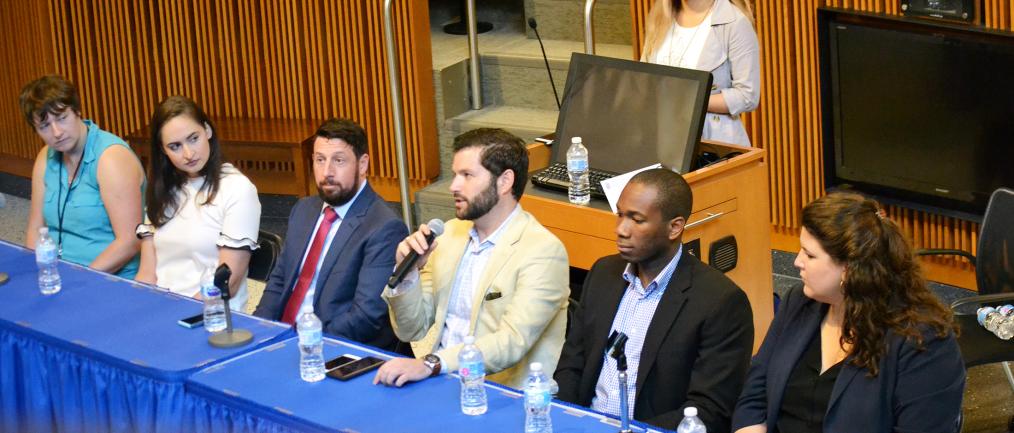
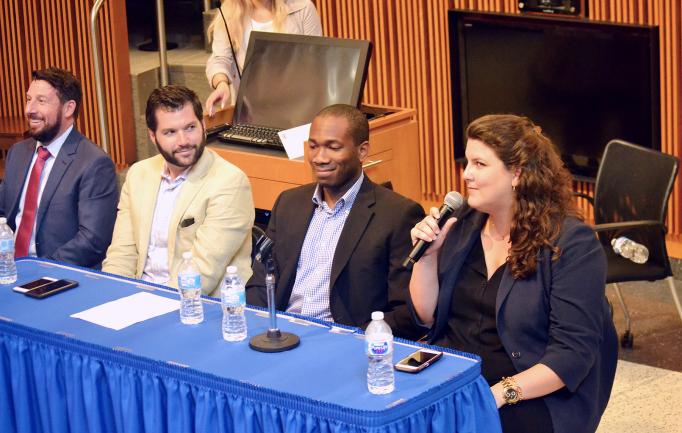
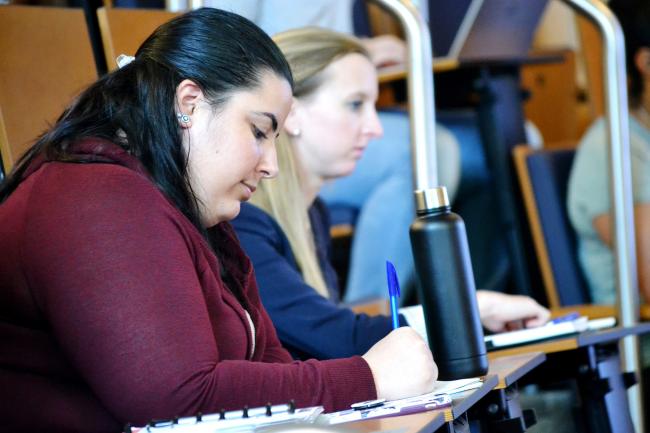
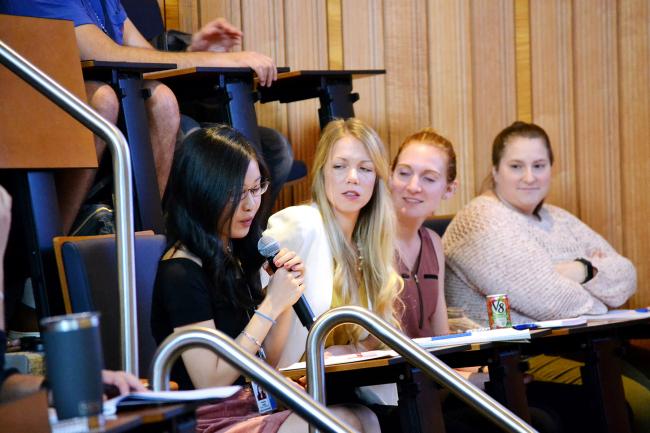
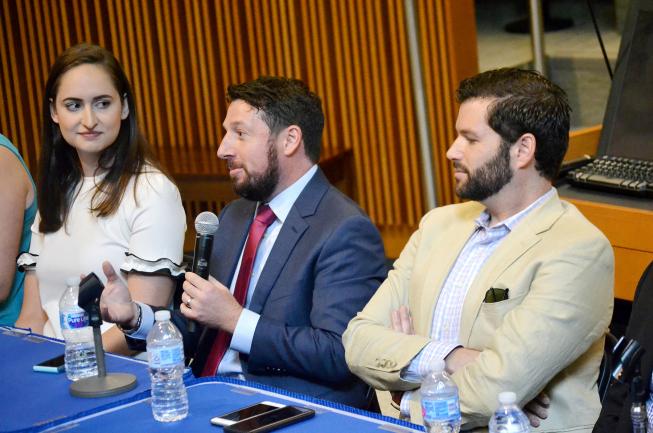
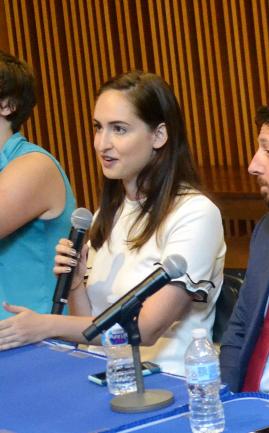
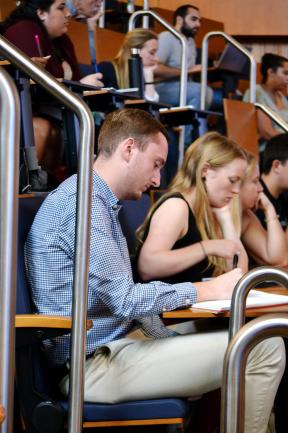
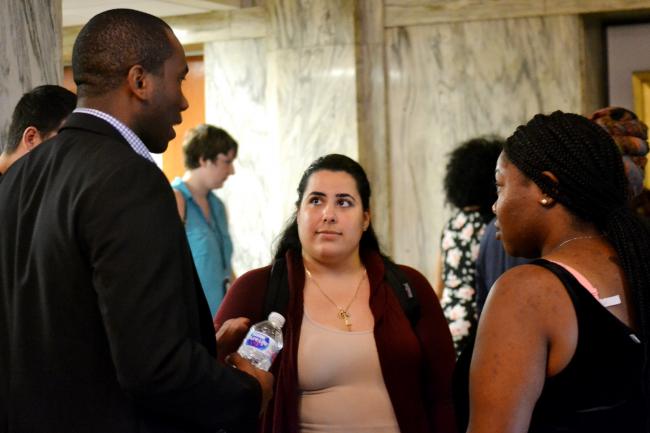
Alumni Panel and Networking Event Flyer:
